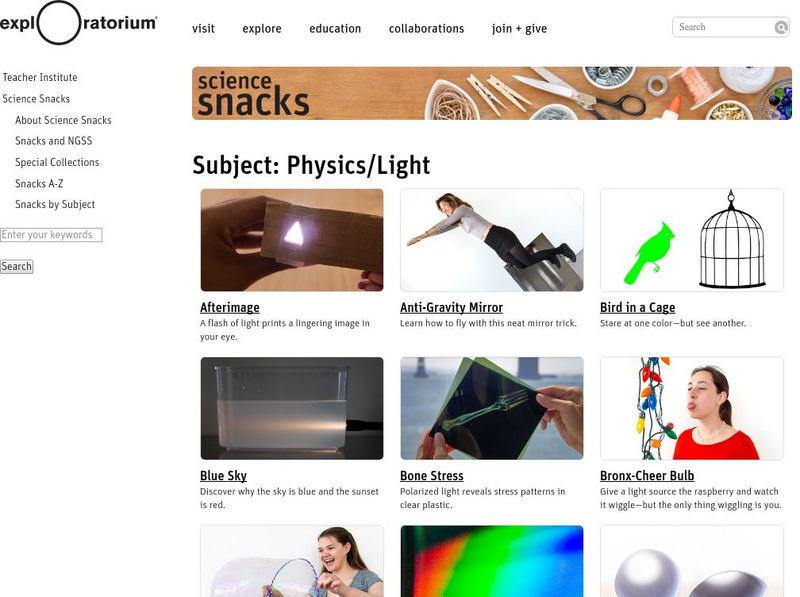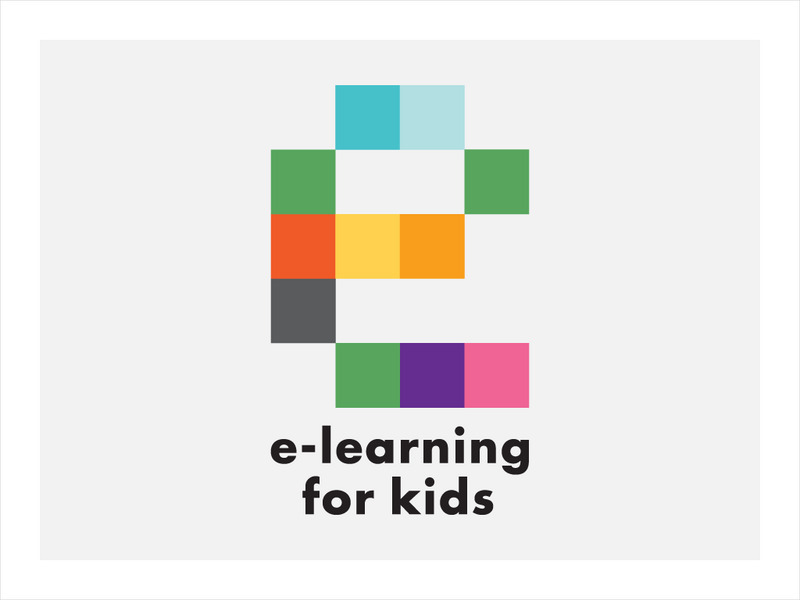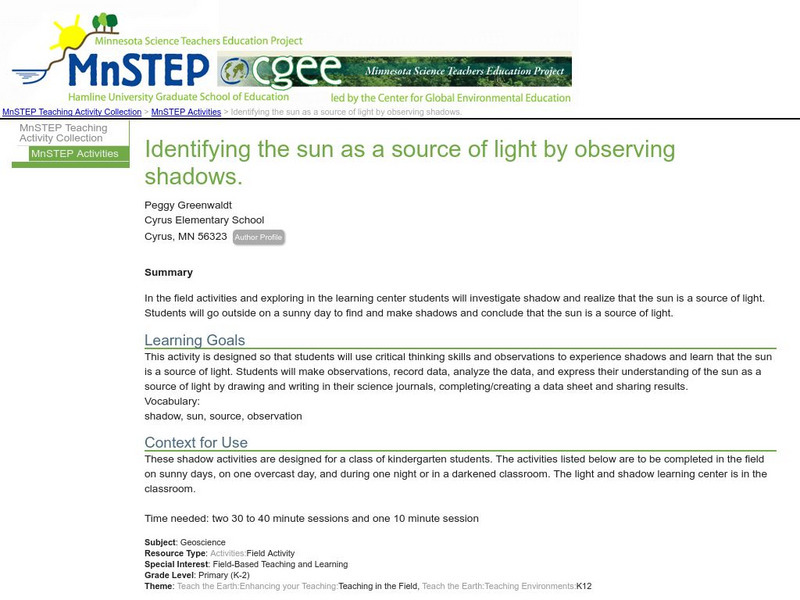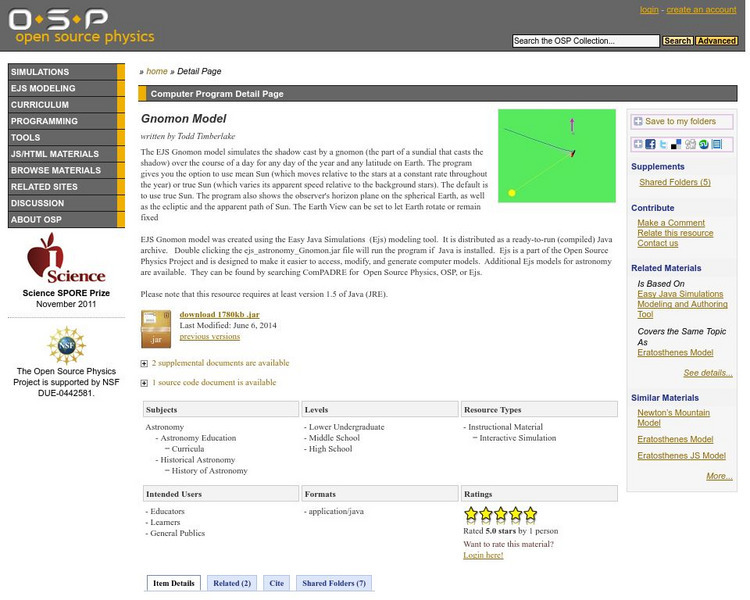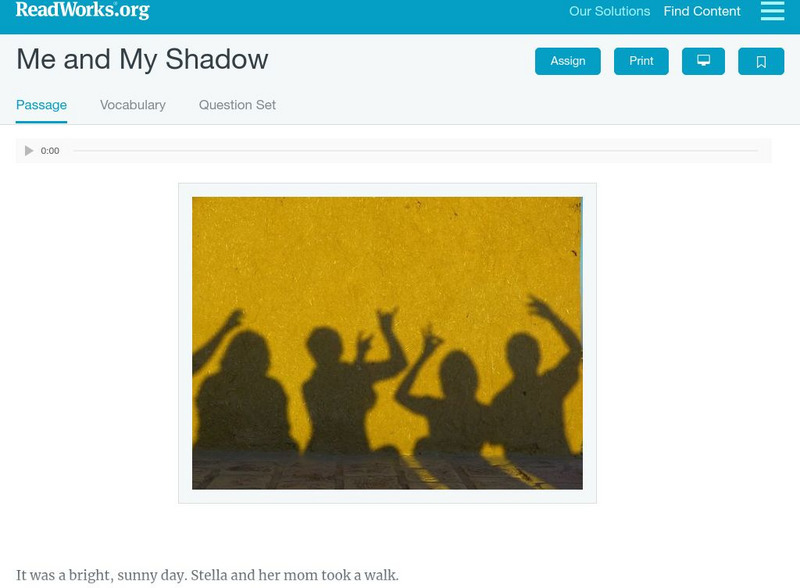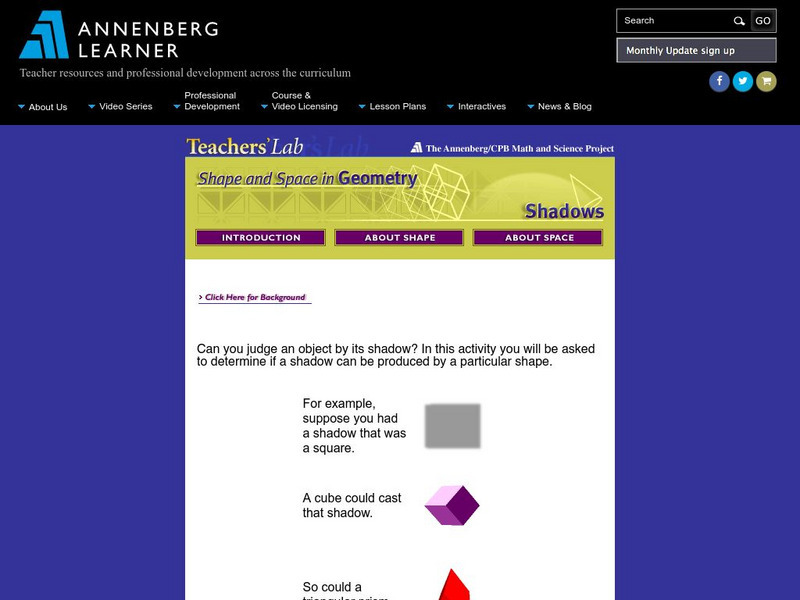Hi, what do you want to do?
Harvard University
Harvard Smithsonian: Everyday Classroom Tools
The focus of this series of lessons is to engage students in an exploration of the world around them. The emphasis is on inquiry as students learn about the earth, sun, light, shapes and more.
Exploratorium
Exploratorium: Science Snacks: Physics/light
Here is a large collection of simple science class activities for understanding the physics of light.
Unite for Literacy
Unite for Literacy: Earth and Sky: Show Me a Shadow
A picture book about shadows. Book includes audio narration in 16 additional languages with text in English.
PBS
Pbs Learning Media: Night Light Video
Watch PEEP and Quack [8:49] have fun with shadows in the middle of the night using flashlights. They learn that shadows can grow and change shape by rotating the object. An additional hands-on activity is provided for learners along with...
PBS
Pbs Learning Media: Shadow Shape Game
Play with PEEP to explore how shadows change when the position of light changes. Detailed teaching tips are included as well as additional shadow activities for the students.
PBS
Pbs Learning Media: Shifting Shadows
Why does your shadow move throughout the day? Watch this PEEP video [1:27] to understand how the sun's movement causes our shadow to change direction, shape, and size. Also included are teaching tips and how to conduct your own chalk...
Other
Astronomical Society of the Pacific: To Every Season There Is a Reason
Provides an in-depth explanation of seasons including why temperate and tropical climates have different seasonal cycles.
Utah Education Network
Uen: Trb 3:1 Investigation 5 Making a Sundial
Make a sundial and learn how to use it.
PBS
Pbs Learning Media: Super Scientists
Grab your science tools and explore with PBS KIDS. Through hands-on activities and exciting media that transports you to space and in the Earth, this collection will bring science to life in your classroom. These resources help students...
Florida State University
Florida State University: Molecular Expressions: Shadowbox Theatre
Have you ever thought about your shadow? One way to learn about them is to make your own shadow box theater--once a very popular form of entertainment in Europe during the 1800s and early 1900s.
E-learning for Kids
E Learning for Kids: Science: Scotland: What Are Shadows?
Aggie lives in a cottage near Loch Ness in Scotland. Help her identify shadows and match different objects with their shadows.
E-learning for Kids
E Learning for Kids: Science: Scotland: How Are Shadows Formed?
Join James, as he tries to make a dog appear on the wall by using only his hands. Find out how he does this.
E-learning for Kids
E Learning for Kids: Science: Scotland: Why Do Shadows Change During the Day?
William is a Scottish boy who is learning about the sun and how it casts shadows. Try to help him find out.
Science Education Resource Center at Carleton College
Serc: How High Is Big? Using an Astrolabe
Students observe and measure the shadows of fixed objects throughout the school year to learn about how the seasonal change affects the sun's position in the sky.
Science Education Resource Center at Carleton College
Serc: Identifying the Sun as a Source of Light by Observing Shadows
Learners investigate shadows and discover that the sun is a source of light.
Science Museum, London
Science Museum: 3 D Shadows
In this activity students can make a pair of coloured glasses, which allows them to see coloured shadows in 3D. Students will learn what shadows are and how they are produced.
American Association of Physics Teachers
Com Padre Digital Library: Open Source Physics: Gnomon Model
A gnomon is the part of a sundial that casts the shadow. This simulated experiment illustrates the gnomon over the course of a day.
Harvard University
Eyes on the Sky, Feet on the Ground: The Earth's Rotation
Plenty of cool activities about the Earth's rotation can be found here, such as tracing shadows, observing shadows during different times of the day, and tracking the sun's path in the sky to understand the rotation of the earth.
Exploratorium
Exploratorium: Science Snacks: Shadows: The Shadow Knows
This science experiment helps students understand how the size of a shadow depends on the size of the object casting the shadow as well as the position of the light source and screen.
E-learning for Kids
E Learning for Kids: Science: Winery: Why Can We See Through Some Objects but Not Others?
Learn about the properties of materials in their interactions with light, including whether they are opaque, transparent, or translucent, and which of these produce shadows.
E-learning for Kids
E Learning for Kids: Science: Denmark: What Are Light and Darkness?
In this module, students learn about the different sources of light, what causes darkness, and about shadows.
Read Works
Read Works: Me and My Shadow
[Free Registration/Login Required] A literary text about a little girl named Stella who had fun playing with her shadow on a sunny day. A question sheet is available to help students build skills in reading comprehension.
Annenberg Foundation
Annenberg Learner: Where Is the Player?
Examine how multiple light sources produce shadows of differing darkness and length. Move a player (with four light sources) around the field until your image matches the five other images on the page so you can identify where the player...
Annenberg Foundation
Annenberg Learner: Shadows
Can you judge an object by its shadow? Use your mental rotation skills to determine if a shadow can be produced by a particular shape.






